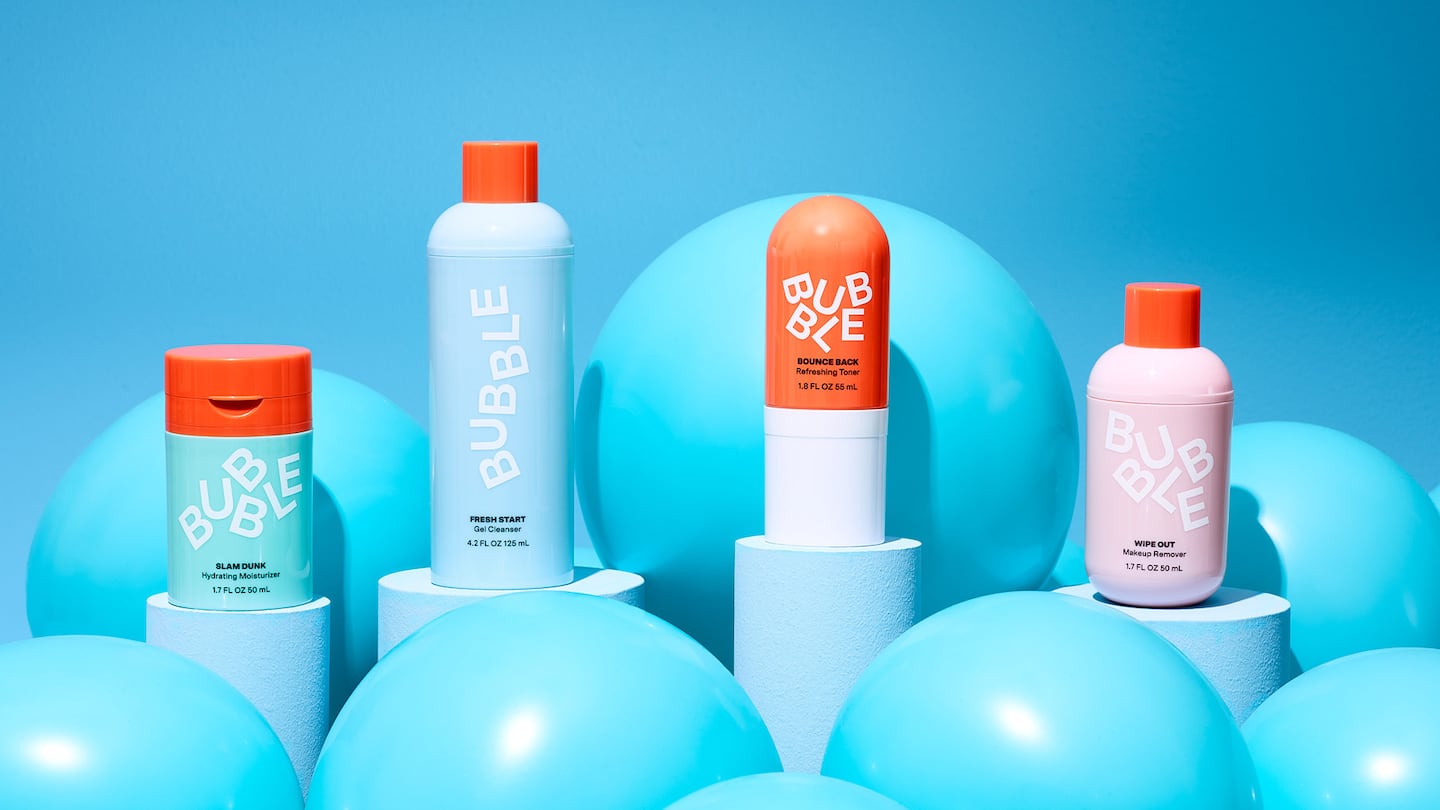
The Business of Fashion
Agenda-setting intelligence, analysis and advice for the global fashion community.

Agenda-setting intelligence, analysis and advice for the global fashion community.

American mega-retailer Walmart announced Thursday that it will become the exclusive retail partner for direct-to-consumer skin care brand Bubble, which launched in November 2020. Bubble’s product lineup debuts in both Walmart stores and online on July 15.
Bubble, which launched in November 2020, offers products designed for younger consumers and sold in multi-step routine bundles. The brand will first appear in stores in the form of back-to-school-themed pop-ups around the US, and later this year, its seven product collection will gain a permanent place in the beauty aisles of almost 4,000 Walmart stores.
Walmart’s announcement of its first DTC skin care partner follows in the footsteps of competitor Target, which has expanded its own offering of DTC personal care brands in recent years, including the introduction of men’s shaving brand Harry’s and female counterpart Flamingo, as well as natural deodorant company Native and makeup label Winky Lux. Walmart is hoping to build up its own DTC offering, bringing more indie and upcoming brands into its beauty aisles, as consumers found themselves relying more heavily on mass retailers for beauty over the past year.
“So much of our business is based on the fact that we have customers shopping with us every week, making the beauty experience part of their weekly shop with Walmart, both online and in stores,” said Paula Ryan, merchandising senior director of Walmart US Beauty.
ADVERTISEMENT
Walmart has previously forged partnerships with DTC players in other industries, such as dental care brand Quip and menstrual health label Lola. Along with bringing digitally-native brands into its stores, Walmart is investing in its own digital presence, hosting livestream events with TikTok to connect with consumers.
“We are seeing a shift towards social in the way customers are shopping for beauty, and you’ll see that reflected in how we’ve further amplified our social media presence to build even more connections,” added Ryan.
For Bubble, Walmart’s reach — 20 percent of personal care purchases in the US are made at Walmart, according to research firm TABS Analytics — made partnering with the retailer a “no brainer,” said Shai Eisenman, the brand’s founder and chief executive.
“Target has 1,900 stores, Walmart has 4,000 [in the US,] so just the difference in accessibility is so huge,” she said.
Accessibility, she added, is a particular sticking point with Bubble’s target demographic, young consumers, who the brand has reached in the past through social media and its influencer ambassador programme. In doing consumer research, Bubble spoke to over 6,000 teens and found access was especially crucial for shoppers between the ages of 13 to 23 years old. Of that age group, 82 percent prefer to make purchases in stores, Bubble’s survey found, and 71 percent typically make their purchases in cash. Young consumers are also less likely to buy from brands or websites they didn’t recognise. Those findings, in part, drove the brand to pursue a partnership with a physical retailer.
“We felt like we’ve got a lot of things right, but one thing that we felt like we did all wrong was accessibility,” said Eisenman. “We knew that in order to make the brand a true standard for skin care … it [had to be] significantly more accessible and by making it truly available for everyone, even if they don’t have a credit card.”
Walmart also offers access to its own massive audience — around 220 million customers visit Walmart stores weekly, according to the company — as Bubble prepares to widen its core consumer target group. Since its inception, the brand has primarily focused on teenagers, leaning on teen ambassadors, including musician Kenzie Ziegler and actor Rudy Pankow. But Eisenman soon recognised focusing only on teens could limit the brand, and has since transitioned to using the phrase “young skin” rather than “teen skin” in its marketing so that Millennials and older age brackets are also included.
“When we launched the brand, we got thousands of messages on social media from 22-year-olds saying, ‘Oh, so I can’t use this product?’” said Eisenman. “So we realised that the right kind of terminologies are [Bubble’s products work] for young skin.”
ADVERTISEMENT
Related Articles:
The New Wave of Brands That Want to Make Acne Fun
As awareness grows about the perils of sleep deprivation, beauty and wellness brands are flooding the market with an array of products to cash in on the booming opportunity.
Going public is usually a pivotal moment in a company’s history, cementing its heavyweight status and setting it up for expansion. In L’Occitane’s case, delisting might be a bigger conduit for growth.
Brands say they’re barreling ahead with marketing and commerce on the app, even as the clock starts ticking for owner ByteDance to sell it or shut it down.
The Spanish beauty and fashion conglomerate’s smart acquisitions and diverse portfolio could be a big draw for investors. Plus, Adidas is set to confirm its stellar first quarter.